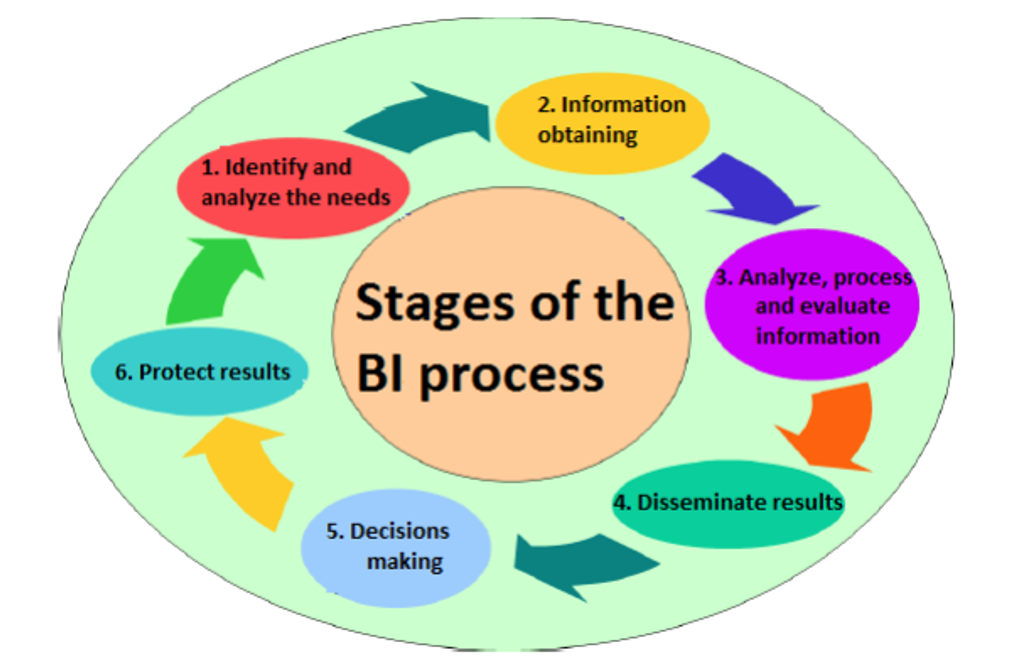Technology monitoring and intelligence process.
The main steps within a technology monitoring and intelligence system for a innovatiove organisation.
There is a general consensus about the steps or stages of a technology monitoring and intelligence process. Those identify a number of general stages that, by agreement, are included in the picture below:

It is important to highlight that the process begins with the enterprise or organisation analysis strategy to refurbished the business strategy later. Therefore it is a circular and iterative process that begins and ends with the definition of the main strategy.
The stages can be defined as:
1. Identify and analyse the information needs:
Based on the strategy, the primary task is: to identify and clarify the issues to attend, this is critical information that can help to respond to the defined challenges. At this stage, to identify the Key Intelligence Topics (KIT) is of great help in order to detect what is really important and to be up to date is imperative. The KIT are defined as "external issues to the organization that affect critically its competitiveness" (Rovira, C. 2008). They are determined by each activity within the value chain and they usually are accompanied by descriptors, keywords, priority, time horizon, etc so to be more precise.
At this first stage, it is also important to analyze available means, resources and collaborators that can be involved in it. This process is of collective reflection and can be supported by the implementation of a technology monitoring self-testing, which we will deal in following lessons with.
2. Gathering of information:
First, one should design and implement the information-gathering strategy. To this end, the information search objectives are defined and a search strategy is formed so that, based on the identified needs, we will be able to locate and capture information in an organized way. Some essential tasks are developed: keywords identification, expert validation, relevant information sources selection, search equation formulation and corpus or records elaboration.
3. Analyse, process and evaluate information:
Analyze and process the information gathered, then select and filter what is relevant, doing all kinds of automated and human analysis to draw conclusions. To this end, validation criteria for the obtained information are used, also analytical techniques and specialized computer tools that help the team to select relevant information depending on search targets.
4. Results dissemination:
The goal is to develop monitoring products so the information is distributed to the correct person in charge of each case. The technology monitoring products are supports made of information results, which are obtained from the technology monitoring process and will define the dissemination of the results means in the organization. Usually, the most relevant are:
● Newsletters or monitoring reports
● Alerts
● Technolgy opportunities bulletin.
● Foresight and trend report.
● Patent studies.
● Intranet.
● Blog and social networks.
5. Decisions making:
To use the information results and manage its implications. When decisions are unpleasant potential conflicts can awake and that must be managed by the organization.
6. Protect results:
This process provides, as a result, the possibility to discovering ideas, opportunities and even projects, that is why the organization must develop a proactive strategy of knowledge management to prevent others from appropriating the value of the resulting ideas.
Etiquetas
- #Open_tools
- Actividades
- Análisis
- Autodiagnóstico
- Canvas
- Casos
- Certificación
- Colaboradores
- Comunidad de práctica
- Conceptos
- Contenidos
- Copyright
- Curso de verano
- Debate
- Derechos de autor
- Estrategia
- Fuentes
- H2020
- Herramientas
- Informes
- Inteligencia competitiva
- InteligenciaUA
- lecturas
- Matrícula
- Metodologías
- MOOC
- open access
- Open Innovation
- OVTT
- Patentes
- Planificación
- Políticas públicas
- Propuestas I+D
- Publicaciones científicas
- Redes
- Sistema VT&IC
- Vigilancia tecnológica
